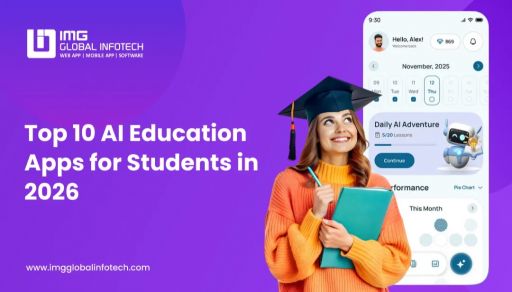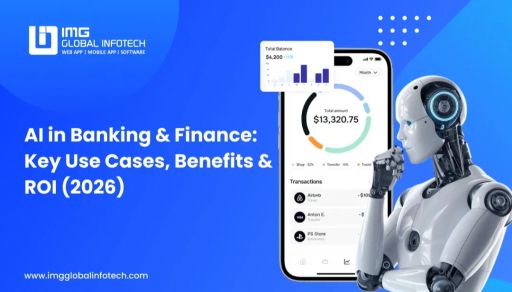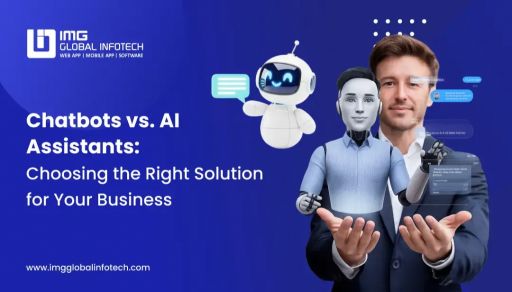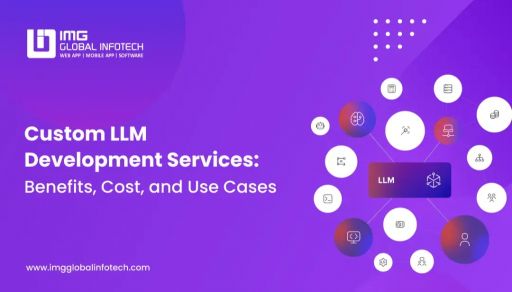Artificial Intelligence In Telemedicine: Transforming Virtual Healthcare
Dipti Singhal
Sep 10, 2025
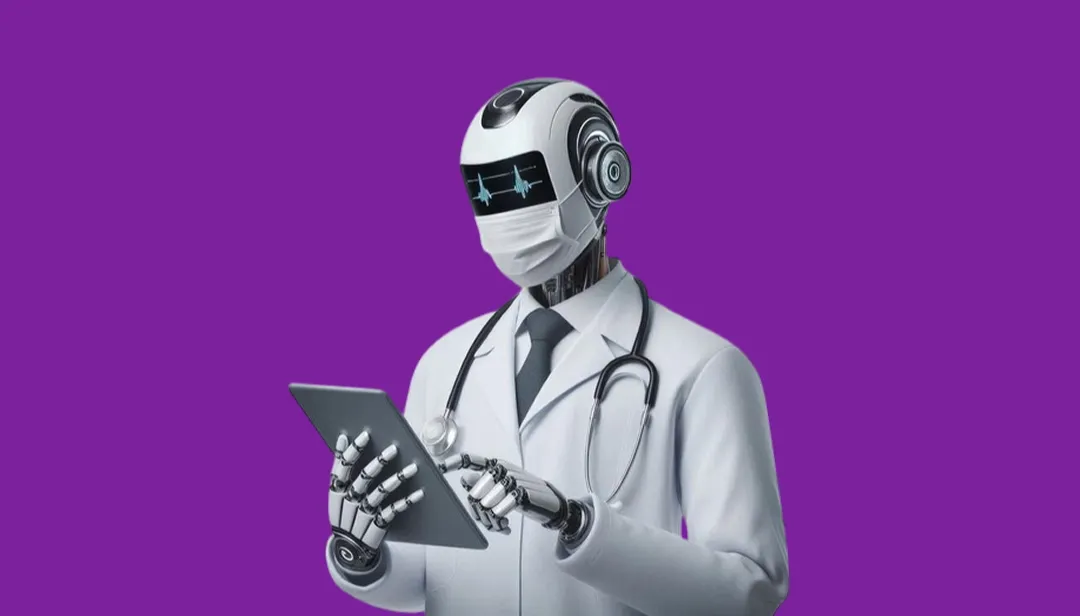
Artificial Intelligence (AI) is transforming healthcare service delivery models with telemedicine and starting to introduce a distinct paradigm, called virtual healthcare. The combination of telemedicine and AI will continue to expand the duties of remote healthcare delivery, resulting in services that are more intelligent, faster, and more reliable. AI is improving digital health in all respects, from predictive analytics and diagnostic support to real-time patient monitoring and virtual health assistants. Most of the changes are providing improved access for patients who live outside urban settings, and are two of the six underpinning transformations that AI is enabling - on-time interventions by decreasing the cost of problem-solving for doctors through improved decision-making processes. There are many adopters of AI-enhanced virtual care service-delivery solutions and in the future we can expect easy to navigate individualized, comprehensive, patient-centric platforms that allow efficient, personalized, on-demand access to connect the gaps in the services that traditional systems of the past created, and that optimize the delivery of healthcare experiences for everyone.
What is AI in Telemedicine?
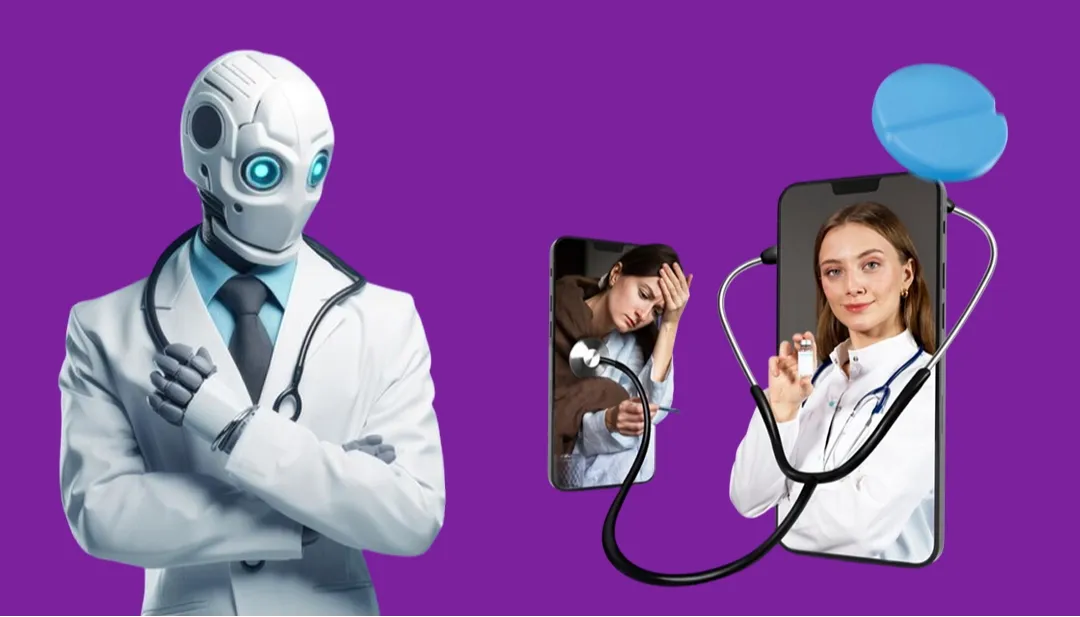
AI in telemedicine refers to the deployment of artificial intelligence technologies to continue to shift the paradigm of remote health service delivery. AI models use artificial intelligence-based technologies that include machine learning, natural language processing, and predictive analytics to help comprehend the implications of the diagnosis, treatment plans, and patient monitoring opportunities for practitioners of telemedicine. Artificial intelligence in telehealth will enable technology to analyze medical images, and can monitor the patients' health data, and provide recommendations for practitioner support based upon the whole of the reported data obtained. The use of frameworks that incorporate AI enabled applications for telemedicine will improve the outcomes quality and overall provide society with lower cost, timely interventions for patients, particularly for acute issues during time-sensitive opportunities associated with blood clotting, positioning, dehydration, and concussion, or injury, which will enhance the healthcare outcomes; and overall, improve the feasibility of meaningful remote patient care in a manner that is acceptable socially and patient focused.
Key Applications of AI in Telemedicine
Artificial Intelligence (AI) is transforming healthcare and, in particular, the development of telemedicine is using AI to produce a more efficient, more accessible, patient-centered system. With the use of machine learning, natural language processing, and predictive analytics, AI will facilitate smarter, faster, and more reliable remote healthcare. The ten most impactful ways AI is appearing in telemedicine include the following:
1. Virtual Health Assistants
Since the telemedicine boom of the pandemic, culpable for opening up multiple market opportunities for AI, a plethora of chatbots and virtual assistants using AI have appeared, 24/7 and always accessible to patients. Virtual Health Assistants can assist patients with answering questions, advising on booking appointments, sending medication reminders, and walking patients through more basic medical processes, easing the task of managing each patient upon a physician's practice.
2. Remote Patient Monitoring
Wearable devices, and AI applications, can grab real-time health data that can include heart rates, blood pressure, glucose levels, and oxygenation levels. The AI element will catch this data and analyse it and once it sees an anomaly, it could alert a health professional, often with remote patient monitoring to quickly intervene when signs of deterioration present, especially useful in chronic disease management.
3. AI-Based Diagnostics
To assist with the telemedicine aspect of remote diagnostics, AI-based diagnostics can assist physicians reduce the time taken, heavily in the field of radiology or dermatology, to conclusively triangulate the visual evidence arriving from diagnostic images such as X-rays, MRIs, and CT scans. This can be electronic or attachable to a telehealth platform service; however, when appropriately attached it can affirm/finalize a percentage rating accuracy surrounding the diagnostics; however human input can either reject or accept such an assessment.
4. Predictive Analytics for Disease Management
Artificial intelligence in telehealth can analyze historical health records and lifestyle information to examine the likelihood of chronic disease like diabetes, hypertension, or heart disease. As a result, telemedicine services can ultimately make recommendations for preventive services and personalized healthcare plans.
5. Natural Language Processing (NLP) for Virtual Consultations
AI uses NLP technology to stream live doctor-patient conversations, summarize them effectively, and provide structured medical records. NLP technology is also the basis of the “symptom checker” that helps patients describe their health concerns in greater detail when meeting virtually with their doctor.
6. Medication Management and Prescribing
AI is used by telemedicine organizations to produce safe and correct prescriptions based on the patient’s history, allergies, and possible drug interactions. AI can recommend adjustments to prescription dosages and was even able to tell if the patient complied with medication protocol.
7. Mental Health Tools
AI Telemedicine app development provides computerized “therapist” chatbots, mood trackers, and behavioral analysis for things like early detection of stress, anxiety, or depression. Therefore, patients receive timely intervention and referrals from the AI when they need to engage therapists or psychiatrists.
8. Customized Treatment Plans
AI examines all patient data (like genetics, lifestyle habits, and past medical history) and produces recommendations for personalized treatment plans. This is beneficial for treating patients with oncology or cardiology or with rehabilitation therapy via telemedicine.
9. Fraud Detection and Data Security
Telemedicine platforms handle sensitive medical information. Artificial intelligence in telehealth makes it safer for telemedicine platforms to use those sensitive medical data by monitoring suspicious activity, warning against identity-theft, and monitoring for insurance fraud, which strengthens trust and trustworthiness, and helps them comply with regulations around healthcare delivery.
10. Administrative Automation
Telemedicine and ai in healthcare reduces administrative tasks by automating regular tasks like billing, insurance claims processing and managing and retaining patient records. Decreasing the administrative burden on healthcare practitioners so that they may concentrate on treating patients rather than dealing with paperwork.
Benefits of AI in Telemedicine
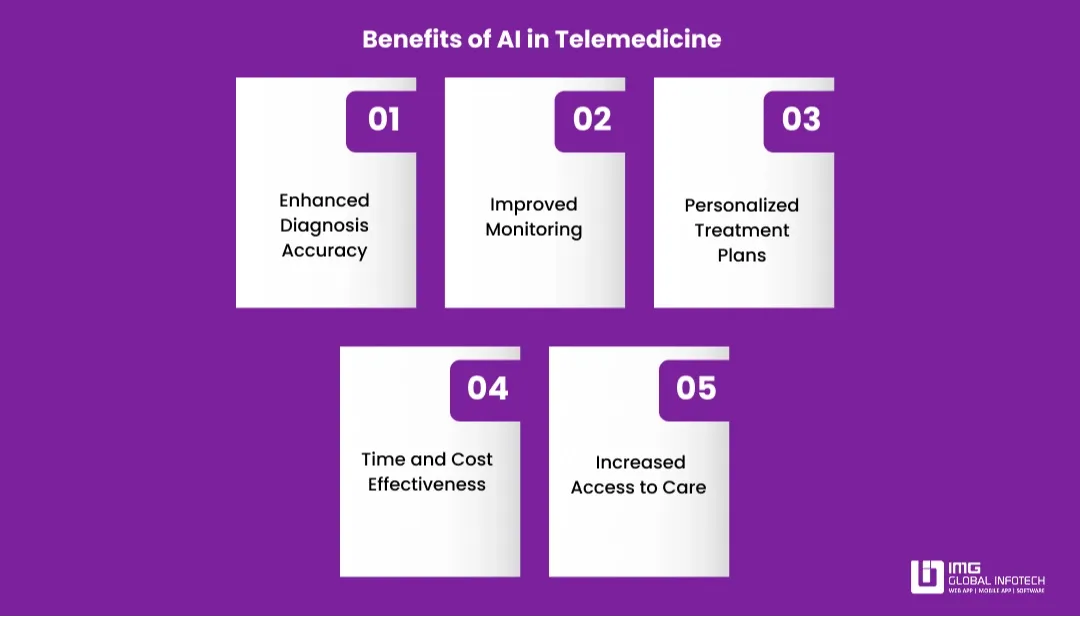
Artificial Intelligence (AI) is revolutionising the healthcare sector and nothing can provide improvements in efficiency, accuracy and access like when it is paired with telemedicine. When you complement telemedicine with data and insights, patients benefit by getting a superior experience and outcome in healthcare. Here are five primary best way to invest in ai and telemedicine:
1. Enhanced Diagnosis Accuracy
AI telemedicine diagnostic tools help in clearly analysing any medical imaging whether general imaging, lab results with value ranges or patient histories providing physician' healthcare delivery with accurate enablement of patient and disease intervention with great speed. Therefore, AI enables doctors to identify diseases earlier and reduce human error both of which contribute to defective recommendations for treatment.
2 . Improved Monitoring
Wearable devices powered by ai telemedicine track vital signs such as blood pressure, glucose levels, and oxygen saturation. If there are any issues then AI algorithms track everything and alert healthcare providers in real time, ensuring immediate action upon, precise intervention, the right care, and reducing the fallibility for patients with chronic or critical conditions.
3. Personalized Treatment Plans
Ai telemedicine assesses patient lifestyle factors, medical histories, and gene information in order to create customized treatment plans. The telehealth platform can then relay these plans to patients in real time, giving them customized treatment monitoring without the need to visit a hospital frequently which improves treatment compliance and symptomatic recovery. In addition.
4. Time and Cost Effectiveness
Telemedicine AI can relieve healthcare professionals from administrative tasks like scheduling, billing, and tracking patient health records. AI can also help eliminate unnecessary hospital visits by providing patients real time health assessments. This will not only help save money for patients but also allow medical practitioners more time for direct patient care!
5. Increased Access to Care
AI-enabled telehealth can improve access to quality care for remote and underserved populations by removing physical and geographic boundaries. Virtual assistants and symptom checkers, and AI-enabled consultations can all help ensure healthcare is accessible for everyone everywhere.
Challenges and Risks to AI in Telehealth
Additionally, while AI-enabled care in telemedicine providers has a great deal of advantages, it also presents challenges and potential risks that must be addressed to ensure the delivery of safe, and reliable health care.
1. Data Privacy and Security
If you want to build an AI medical scribe you must know it will help in collecting and processing sensitive patient data, including medical history and personal information. AI, as a systems technology, has an innate need for robust datasets in order to operate and train on which creates the even greater risk of breaches or hacking of sensitive personal health data. Patient confidentiality is paramount and compliance with health legislation (e.g., HIPAA) needs to be complementary with our growing awareness of cyber hacking and ensuring encryption.
2. Bias and Inaccuracy in AI Algorithms
Telemedicine ai models cannot be better than the data they were trained on. Also, if the data sets are not representative of the real world, there is a risk that the algorithms will still have biased outcomes and inaccurate predictions, especially when diagnosing statuses of health across different demographic groups leading to false diagnoses, delayed care, and inequities in access within healthcare systems.
3. Lack of Human Backing and Accountability
AI does not possess human clinical judgment, or even, judgment, human empathy, or holistic decision making. If humans rely only on AI tools to make decisions, the likelihood of errors occurring would only go up if there is no human eye or intel. Moreover, when there is a misdiagnosis from an app like Babylon Health, there is also no stakeholder accountability in a legal sense or much less of an ethical challenge.
The Future of AI in Telemedicine
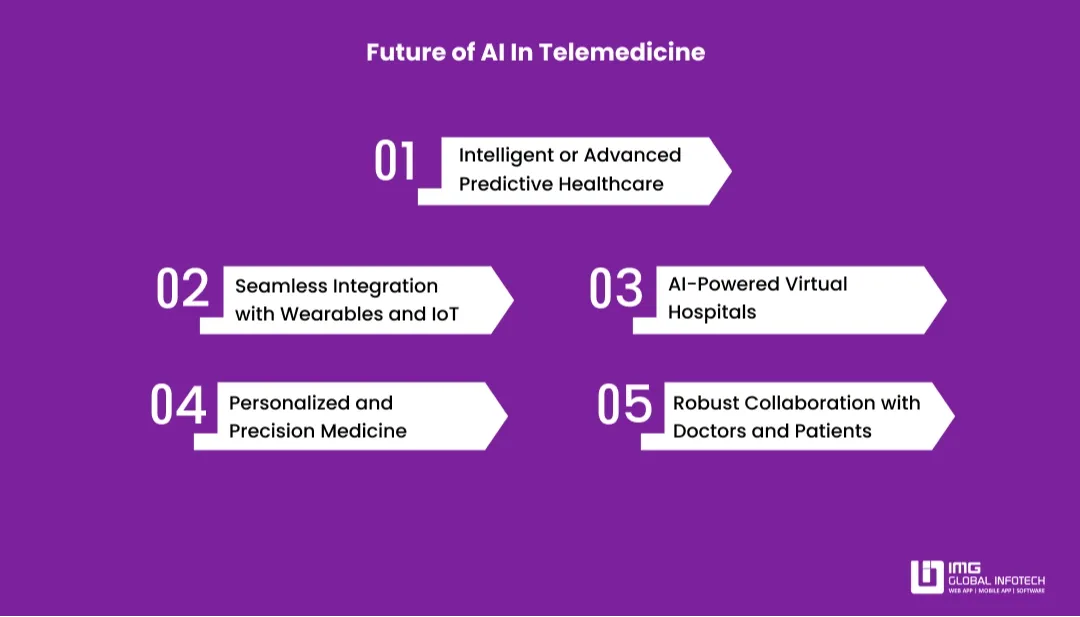
The future for telemedicine is already being shaped by Artificial Intelligence (AI) with the way technology impacts health care delivery, management, and experience. And, as technology continues to evolve, artificial intelligence and telemedicine will only continue to spark new opportunities for remote care. Below are five key features defining the future of AI in telemedicine:
1. Intelligent or Advanced Predictive Healthcare
AI app development will increasingly rely on big data with predictive analytics to predict an active health concern before it develops into a serious health concern. Along the lines of prevention, this will help doctors develop plans for preventive care and involve increased appropriate hospitalizations.
2. Seamless Integration with Wearables and IoT
The future of healthcare registration will be characterized by a more intimate connection between AI engines and wearable devices and Internet of Things (IoT) sensors. Having biosensors that regularly check vitals like blood sugar levels, heart rate, oxygen saturation will allow doctors to have instantaneous access to the results and AI systems will be able to effectively guide their advice and suggest interventions, and perhaps allow interventions sooner.
3. AI-Powered Virtual Hospitals
We will see the rise of completely virtual and integrated health care ecosystems that use artificial intelligence and telemedicine to allow patients to schedule time to see a doctor, set up diagnostic tests, have prescriptions sent all from home, or visit a digital hospital on an app on a phone. This facility will generate a new standard for both managers and patients on convenience and access to care.
4. Personalized and Precision Medicine
Excellent algorithms will utilize DNA, genes, lifestyle, medical history and the latest precision medicine models and allow AI logic to create compatible treatment options. In a lot of ways, precision medicine is the new standard of care in telemedicine, and it is used to make progress with outcome-based treatments.
5. Robust Collaboration with Doctors and Patients
Telemedicine and ai should never be a substitute for doctors but it should augment their capabilities and relieve him or her of low value tasks, like assuring medications and dosages are presented, and allowing the machine to give the doctor useful clinical guidance based on their analysis of patients with similar or similar treatments. Thus, doctors can spend more time focused on patient-focused care relationships and enjoy a general greater sense of health, wellbeing and autonomy.
Why Choose IMG Global Infotech to Make an AI Telemedicine App?
IMG Global Infotech specializes and is eager to engage with our AI telemedicine professional. We have considerable expertise developing innovative, unique and effective AI telemedicine based apps, and have a strong understanding of machine learning and telehealth solutions. Our Healthcare app development company is dedicated to making apps that help doctors decide which treatment is the best, reasonable and warranted and then makes precise dosage, diagnosis, and real-time monitoring, an easy process through video chat. We have come up with solutions that put data privacy and a user-friendly way of using the app and the scalable architectures that can support the patient demand that continues to grow ahead of everything else. In this way, healthcare providers can install a stable telemedicine platform that is not only technologically innovative and reliable but also cost-effective. This will automatically translate to increased patient care, better accessibility, and a digital healthcare revolution.
Conclusion
AI in telemedicine market change in virtual healthcare as it renders it quicker, smarter, and more accessible. The application of AI ranges from accurate diagnostics to predictive analytics besides the use of real-time patient monitoring along with personalized treatments to name a few and this has brought in a complete change in the remote delivery of healthcare. The ai in telehealth and telemedicine market associated with data security and the bias present in algorithms still go on but the benefits are much more than the risks when human expertise is involved. The future trajectory of technology indicates that AI-driven telemedicine will carry on to its role of improving patient outcomes, lowering costs, and making it possible for quality healthcare to be accessible to people at any time, any place, thus effectively putting an end to geographical and accessibility barriers.
Dipti Singhal is a skilled Content Writing Specialist at IMG Global Infotech, with strong expertise in creating engaging, SEO-optimized content for various industries. She focuses on blending storytelling with effective keyword strategies to help businesses connect with their audience and improve their online visibility. Passionate about delivering high-quality content that drives real results, Dipti plays an essential role in strengthening the company’s digital presence.



